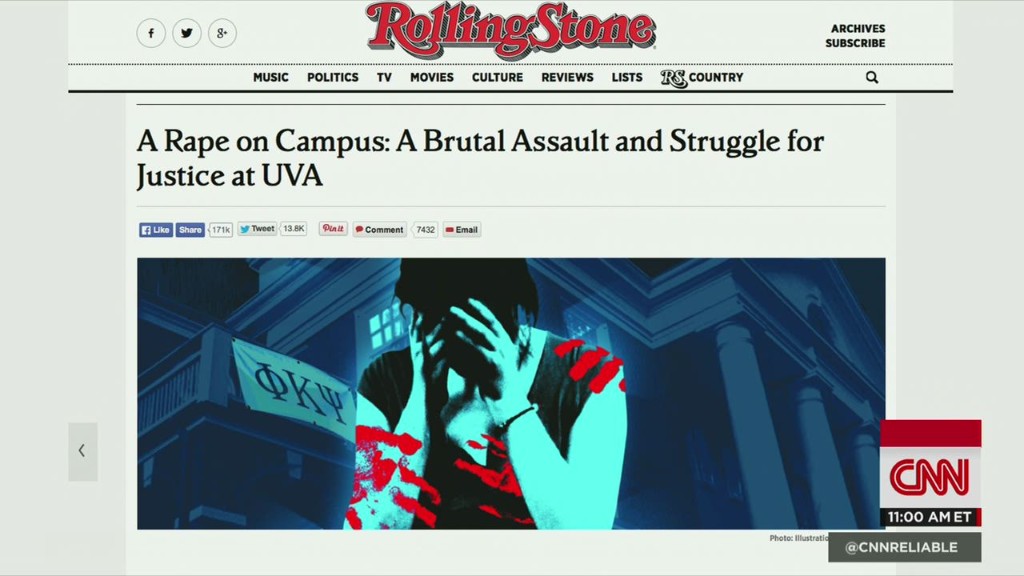
Rolling Stone has apologized for its bombshell article "A Rape on Campus" -- a crushing blow for a magazine that has published so many sensational and thoroughly-sourced feats of journalism. So what happens now?
The magazine's editors spent the weekend belatedly fact-checking the article and reviewing what went wrong.
"We are taking these matters very seriously," said an editor at the magazine who insisted on anonymity.
Some observers are predicting departures from Rolling Stone as a result. Representatives of the magazine declined to comment on Sunday. Jann Wenner, the founder and owner of Rolling Stone, did not respond to requests for comment.
But the editor who spoke anonymously said the magazine would have more to say in the coming days.
November 19 article stuns readers
The crisis meetings at Rolling Stone were prompted by the unraveling of the 9,000-word article, which was written by regular contributor Sabrina Rubin Erdely.
The article described how "rapes are kept quiet" by students and administrators at the University of Virginia. It focused on the story of one freshman student, known as Jackie, who said she was brutally gang-raped by seven men for several hours at a frat party in 2012.
Erdely's article was published on November 19 and immediately stunned readers, grabbed media attention and prompted the president of UVA to suspend all fraternity activities on campus and promise a full investigation.
Less than a week later, critics began to ask questions about some of the details in Jackie's account and about Rolling Stone's decision not to contact the seven alleged attackers.
Erdely defended her process, telling CNN and SiriusXM host Michael Smerconish in a radio interview that she put Jackie's story "through the wringer" and "talked to all her friends."
"Her story is very consistent," Erdely said. "She has clearly been through a tremendous trauma. And I don't doubt that something happened to her that night."
But what Jackie alleged, and what Erdely described, was something very specific: a horrific gang rape.
Many people were -- and many still are -- inclined to give Erdely the benefit of the doubt, given the incredibly sensitive nature of the subject and the damage that can be inflicted through undue skepticism of rape victims' stories.
The Columbia Journalism Review noted on December 2 that "Jackie is far from the only source in the Rolling Stone story, which is rich in reported facts, along with quotes by experts and survivors of rape. Certainly, the main message has had a huge impact so far. But the questions that were not asked now threaten to hijack that narrative."
Chief among those questions were and are: What do the alleged attackers say?
Washington Post investigates and Rolling Stone apologizes
On Friday, the Washington Post reported that it reached one of the seven men, who said he had "never met Jackie in person and never took her out on a date." He also told the Post that he was not a member of Phi Kappa Psi, the fraternity in question.
Furthermore, the frat "said there was no event at the house the night the attack was alleged to have happened."
Around the same time the Post story came out, Rolling Stone published an extraordinary apology on its web site.
"[B]ecause of the sensitive nature of Jackie's story," the magazine wrote, "we decided to honor her request not to contact the man who she claimed orchestrated the attack on her nor any of the men who she claimed participated in the attack for fear of retaliation against her."
"We were trying to be sensitive to the unfair shame and humiliation many women feel after a sexual assault, and now regret the decision to not contact the alleged assaulters to get their account."
Erdely, for her part, has remained silent since the apology on Friday. Her voice mailbox is full and is no longer accepting messages. She did not respond to emails from CNN over the weekend.
On Saturday night, Rolling Stone changed the wording of Friday's apology letter, removing a sentence that said "we have come to the conclusion that our trust in her was misplaced." That sentence was condemned by some people as blaming the victim.
The revised letter said "These mistakes are on Rolling Stone, not on Jackie."
What went wrong: Was it 'belief getting in the way of facts?'
Over the weekend, Rebecca Lim, the editor-in-chief of the UVA student newspaper the Cavalier Daily, said that some of her fellow students "are unhappy with the ways that Rolling Stone portrayed the university" and frustrated that "it didn't fill in all of the gaps before publishing the article, and ended up hurting a lot of people as a result."
Sandra Menendez, a UVA student who knows Jackie and was interviewed by Erdely but not quoted, said she and several other students "felt really uncomfortable after being interviewed."
Speaking on CNN's "Reliable Sources" on Sunday, Menendez said she concluded that Erdely had an agenda: "I think she was trying to tell a really painful story, which is that sexual assault really does happen at the University of Virginia and also around the United States. I'm not quite sure if the story that was told, you know, really does speak truly to it."
Hanna Rosin, a writer for Slate and The Atlantic who raised questions about the article early on, said on "Reliable Sources" that she thought that if Rolling Stone was going to agree not to contact the alleged attackers -- "which you shouldn't, I don't think" -- the magazine should have disclosed that decision to readers from the very start.
"I think part of what went wrong is belief getting in the way of facts," Rosin said, suggesting that "wanting the story desperately to be true got in the way."


